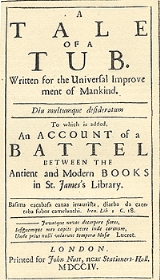
A Tale of a Tub
Overview
Jonathan Swift
Jonathan Swift was an Irish satirist, essayist, political pamphleteer , poet and cleric who became Dean of St...
, composed between 1694 and 1697 and published in 1704. It is arguably his most difficult satire
Satire
Satire is primarily a literary genre or form, although in practice it can also be found in the graphic and performing arts. In satire, vices, follies, abuses, and shortcomings are held up to ridicule, ideally with the intent of shaming individuals, and society itself, into improvement...
, and perhaps his most masterly. The Tale is a prose
Prose
Prose is the most typical form of written language, applying ordinary grammatical structure and natural flow of speech rather than rhythmic structure...
parody
Parody
A parody , in current usage, is an imitative work created to mock, comment on, or trivialise an original work, its subject, author, style, or some other target, by means of humorous, satiric or ironic imitation...
which is divided into sections of "digression
Digression
Digression is a section of a composition or speech that is an intentional change of subject. In Classical rhetoric since Corax of Syracuse, especially in Institutio Oratoria of Quintilian, the digression was a regular part of any oration or composition...
" and a "tale" of three brothers, each representing one of the main branches of western Christianity
Western Christianity
Western Christianity is a term used to include the Latin Rite of the Catholic Church and groups historically derivative thereof, including the churches of the Anglican and Protestant traditions, which share common attributes that can be traced back to their medieval heritage...
.
The "tale" presents a consistent satire of religious excess, while the digressions are a series of parodies of contemporary writing in literature
Literature
Literature is the art of written works, and is not bound to published sources...
, politics
Politics
Politics is a process by which groups of people make collective decisions. The term is generally applied to the art or science of running governmental or state affairs, including behavior within civil governments, but also applies to institutions, fields, and special interest groups such as the...
, theology
Theology
Theology is the systematic and rational study of religion and its influences and of the nature of religious truths, or the learned profession acquired by completing specialized training in religious studies, usually at a university or school of divinity or seminary.-Definition:Augustine of Hippo...
, Biblical exegesis, and medicine.

